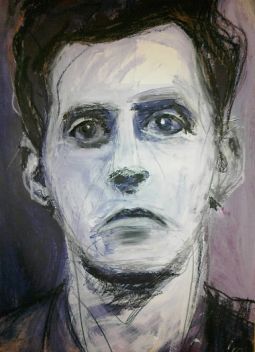Demon: Berlin/Herr Hymne
A character in Demon: Berlin '62.
Character Sheet[edit]

Demon Name: Herr Hymne/Mr. Hymn
Cover Name: Tomas Leverkühn
Virtue: Rigorous
Vice: Passionate
Incarnation: Messenger
Agenda: Integrator
Catalyst: Fidelity
Attributes[edit]
Mental: Intelligence 3, Wits 2, Resolve 2
Physical: Strength 2, Dexterity 2, Stamina 2
Social: Presence 4, Manipulation 2, Composure 2
Skills[edit]
Mental: Academics (Music Theory) 2, Crafts 1, Medicine 1, Occult 2, Science 1
Physical: Athletics 1, Firearms 1, Larceny 1, Stealth 1
Social: Empathy 1, Expression 3 (Music Composition), Intimidation 1, Persuasion 2 (Inspiring), Socialize 1, Subterfuge 2
Other Traits[edit]
Merits: Area of Expertise (Music Theory), Eidetic Memory, Fast Reflexes 2, Small-Framed, Striking Looks 2, Terrible Form 2 (bonus)
Embeds: Just Bruised, Muse, Special Message
Exploits: The Word
Demonic Form: EMP Field, Extra Mechanical Limbs, Sense the Angelic, Essence Drain, Frost Aura, Inhuman Reflxes, Mirrored Skin, Phasing, Sonic Acuity
Health: 6
Willpower: 4
Primium: 2
Aether/per turn: 11/2
Cover: 7
Size: 4
Speed: 10
Defense: 5
Initiative: 7
Armor: n/a
Aspirations[edit]
- Uncover who controls Rundfunk Netzach, a numbers station over which his work was to be played
- Complete his magnum opus
Background & Cover[edit]
It happened to be the case that a certain piece of Infrastructure required that a particular piece of music be played across several DDR radio stations at a given time; most of the piece was irrelevant, actually, but there were a few brief passages that had to be transmitted in a particular order, with particular intervals between them. The God-Machine designated one Stefan Zeitblom to compose the work; as he was a composer much favored by the Ministry of Culture, it made a certain amount of sense. The only trouble was that Zeitblom was a talentless hack who relied on ideological conformity and a willingness to rat out more independent-minded colleagues to gain that favor. And that's where Tomas Leverkuehn came in. In the person of an unknown and unimportant composer, Leverkuehn basically wrote the work for Zeitblom---more subtle forms of inspiration were attempted, but one can't wring blood from a stone---with only the pandering title ("Requiem fuer die Verraten Arbeiter") and a few bland and unremarkable addenda serving Zeitblom's contributions.
Except Leverkuehn became fascinated by the work he was writing; those few, crucial passages contained an austere, otherworldly beauty (sublimity, if we're being precise) that Tomas could not ignore; the rest of the work in comparison seemed not just dull, but a betrayal of the aesthetic purity of what was essential to the piece. Leverkuehn began giving Zeitblom drafts that were contrary both to the God-Machine's purpose and to the principles of Socialist Realism. At some level, he knew he had chosen to Fall, but in the moment, that decision seemed abstruse and unimportant. What mattered was the Work.
If he'd been willing to leave 'Tomas Leverkuehn' behind, that would've made what followed easier; instead, he had to navigate the consequences of both his Fall and an escape into West Berlin---his revelation of himself to Zeitblom in a moment of confusion and weakness had left him exposed. Now he lives in West Berlin; as Tomas Leverkuehn, he composes the occasional short piece that almost no one will hear, or writes music criticism for papers almost no one reads, or (if things are really desperate) gives music lessons, but generally dwells on the fringes of the bohemian artistic/intellectual set.
Five Questions[edit]
Who did you share part of yourself with when you first Fell?
Stefan Zeitblom listened, uncomprehending, as Tomas Leverkuehn suddenly came to understand what had become of him; the ideologue chalked it up to a nervous temperament at the time, but something about the look in the composer's eyes has stayed with.
Who doesn’t know, but suspects you’re not human?
Max Loos, a West Berlin intellectual & critic, who has on occasion collaborated with Leverkuehn on several essays, at first appreciated his colleague's peculiar and singular perspective on matters aesthetic, but has come to believe that that peculiarity is down to something more than mere obsession.
Who would you trust the truest part of yourself with if you absolutely had to?
Since coming over to the West, Hymne has become close with the Confessor, one of the Restorationists---a loose clique of Demons convinced that the God-Machine was somehow broken during the war, and that it requires repair. Though he has thus far maintained a reasonable degree of discretion, Hymne is more and more convinced that the two of them are fundamentally simpatico.
Who could give you up to the angels right now, if they really wanted to?
Herr Kommissar has been aware of Tomas Leverkuehn's appearance and use of Zeitblom since almost the beginning. A direct response to the God-Machine's plans had been in the works when Leverkuehn/Hymne fell, but this did not end Herr Kommissar's interest in or concern with him.
Who thinks they have something on you, when all they really have is smoke and mirrors?
Lt. Hanno Popper of the Bundesgrenzshut is convinced that some of those who have escaped from East Berlin are, in fact, DDR (or even KGB!) agents sent over the wall to spy on the west, and especially its dissident community. Given Leverkuehn's strange habits and interest in radio transmission, one could forgive Popper for getting the wrong idea.